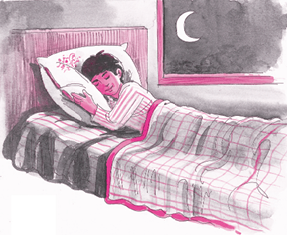Table of Contents

• Our body and brain recover from fatigue after a good sleep.
• We dream while sleeping, but we do not always remember
our dreams.
• During sleep, our heartbeat becomes slower and our temperature and blood pressure go down.
We know enough about what sleep is, though we don’t know what exactly causes sleep. Sleep is a state of rest — an unconscious rest. When we sleep, our body recovers from fatigue caused by the day’s activities. After a good sleep and the rest that it gives, we become alert and active again, ready for the normal activities of the day.
When we wake up in the morning, it is not always possible for us to remember what hap-
pened when we were asleep. We may remember a dream but the rest of our sleep was a kind of darkness in which nothing seems to have taken place.

Several things happen to our body while we are sleeping. As we sink deeper into sleep, our muscles relax more and more. Our heartbeat becomes slower. Our temperature and blood pressure go down. The ever-active brain also slows down so that we can’t think or act consciously. But we dream.
When we wake up, our temperature and blood pressure rise to normal. Our heartbeat and breathing also become normal and we are fully awake, and have forgotten most, if not all, the dreams that we had while sleeping.
• A dream is an activity of the mind when we are asleep.
• Dreams help us sleep through noise and other disturbances.
• Dreams may reveal something about one’s problems, but they cannot tell the future.
What is a dream? It is an activity of the mind that takes place when we are asleep. Some dreams are probable while others are not. That only means that many of the things that happen in dreams could happen when we are awake. Others could not. Dreams seem to be important for several reasons. One is that a dream can help us to sleep through noise or other disturbances. For example, the alarm clock rings, but our mind causes us to dream that the telephone or doorbell is ringing, and that we are awake and answering it.
Certain doctors have found that one’s dreams often reveal a great deal about one’s problems and that, if understood correctly, they can provide a key to the solution of those problems. But we must remember one thing. Dreams cannot be used as a way to tell the future. They simply can never tell the future.
Sleep is the most common experience, but how many of us really think about the wonder and power of sleep? Many poets have written beautiful poems about sleep. Here is one in which the poet is describing the experience of falling asleep. Read it aloud.
Lights Out
I have come to the borders of sleep,
The unfathomable deep
Forest where all must lose
Their way, however straight,
Or winding, soon or late;
They cannot choose.
There is not any book
Or face of dearest look
That I would not turn from now
To go into the unknown
I must enter and leave alone
I know not how.
Edward Thomas
Questions
1. What is the most obvious advantage of sleep?
2. What happens to our body when we sleep?
3. Define a dream in your own words.
4. Why are dreams important? Mention two reasons.
5. Why has sleep been called a wonder?
6. Describe briefly to the class an improbable dream you have ever had.
Grandmothers and mothers sing nice little songs while rocking little ones to sleep. Such a song is called a ‘lullaby’. Do you remember a lullaby in your own language? Tell the class in English what the lullaby says.
